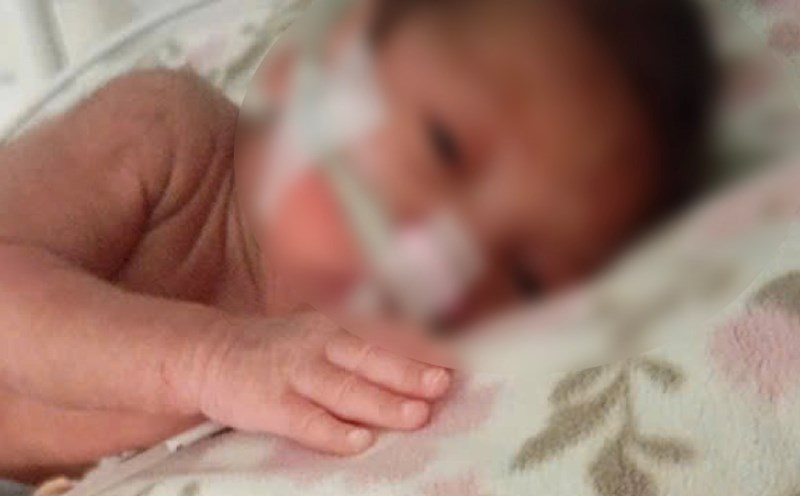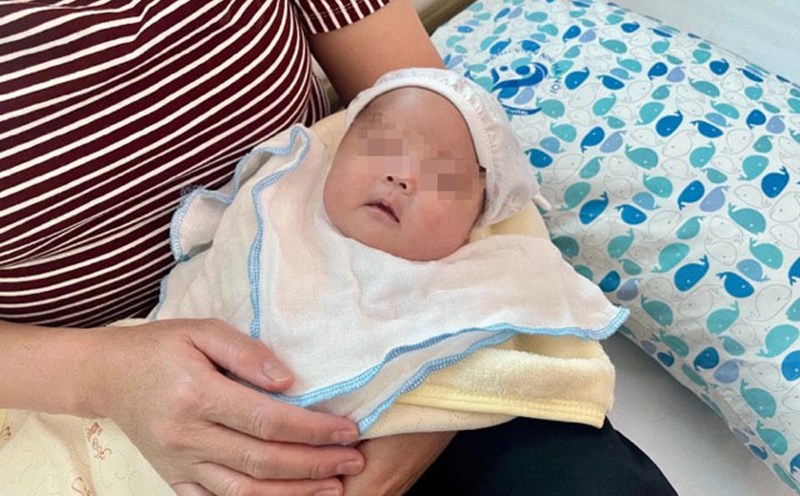Doctors from the Neonatal Department, Phu Tho Province Obstetrics and Pediatrics Hospital, have just successfully treated and raised an extremely premature baby girl in the 24th week of pregnancy, weighing only 550 grams.
The girl is the daughter of the mother H.T. T.M. (residing in Cam Khe, Phu Tho). On April 12, at 24 weeks of pregnancy, Ms. M. suddenly showed signs of labor and gave birth to a baby girl weighing only 550 grams. After giving birth, the child did not cry, was purple all over the body, and had poor reflexes. Doctors from the Neonatal Department placed an emergency intubation tube in the delivery room, supported with ventilation, and kept warm, and transferred to the Intensive Care Unit - Neonatal Department for further treatment.
Assessing this as an extremely premature, low birth weight, and severe respiratory failure, every minute that passed increased the baby's risk of death, the doctors urgently performed the most active resuscitation method for the baby.
The child was placed in a cage, on a high-index ventilator, on-site paraclinical examination, replacement with Surfactant pumps, placed into invasive arterial blood pressure and placed in a central vein catester to maintain capillary and nutritional fluid, regulate alkaline disorders...
Dr. Nguyen Duc Hau, Head of the Neonatal Department, said that premature babies often have many potential risks such as hypothermia, respiratory failure, cerebral and lung bleeding, necrotizing enterocolitis, infections, metabolic disorders, yellow blood thinning, etc.
"This baby is a very premature newborn, very weak in physical condition, easy to describe, the baby's calf is only the size of an adult's little finger, the skin is very thin. Therefore, we determined that this journey will be very difficult, especially the treatment and care process needs to be meticulous, careful, and gentle," said Dr. Hau.
Doctors must consider each type of medicine, not excess or lack of each mililiter of nutrient, ensure temperature and humidity to avoid hypothermia and dehydration, always be close to the issue of infection control...
In the first days after giving birth, the child is always in a critical condition when respiratory failure increases, with many recurrent purines, reduced heart rate, oxygen cycles, and blood sugar disorders. The patient was consulted and had medicine changed, continued to use a ventilator with a very high index, and applied an active treatment regimen.
After 5 days of treatment with a high index of ventilators, the child's condition improved well, and the ventilator index gradually decreased. By the 14th day of treatment, ventilator indicators had dropped to the minimum level.
On the 21st day of treatment, the child's weight began to increase, reaching 650 grams, the patient only had a low glycemic ventilator, had a steady breathing rhythm, the stomach flu started to enter and was given breast milk. During the care process, doctors and nurses were very gentle and careful.
On the 28th day of treatment, the child was given an endotracheal tube, a positive positive positive airway breathing machine, and was monitored to see that breast milk was digested well through each meal, weighing 700 grams. By the 40th day of treatment, the child had eaten breast milk (through sonde) about 12 ml - 13 ml/meal, weighing 800 grams and continuing to maintain the treatment regimen.
After 80 days of treatment, the child's condition improved well, the child had a ventilator removed and was converted to oxygen, at this time the child's weight had reached 1.7 kg. With such positive progress, the baby was born, started breastfeeding and implemented the Kangaroo method ( putting the baby in contact with the skin on the mother's chest).
This method aims to help children avoid physiological respiratory arrest, help regulate heart rate, support brain development, avoid neonatal infections, gastroesophageal reflux, etc.
On July 23, after 103 days of treatment, care, and nurturing efforts, the baby's weight reached 2 kg, he was completely capable of breathing on his own, eating good milk, breastfeeding well, and his health was stable and he was discharged from the hospital.

According to statistics at the Neonatal Department, Phu Tho Province Obstetrics and Pediatrics Hospital, from the beginning of 2025 to now, the unit has received and successfully treated nearly 300 cases of premature babies, of which the rate of extremely premature babies (born before the 28th week of pregnancy) accounted for 7.2%.
Previously, in February 2024, a girl who was also born prematurely at week 24, weighing 550 grams, was successfully raised, becoming the youngest, lightest baby to be saved in Phu Tho province. That is also one of the very few cases of extremely premature babies at the 24th week of pregnancy that have been saved nationwide.











